 Back to selection
Back to selection
Good To Go: New York Film Festival II
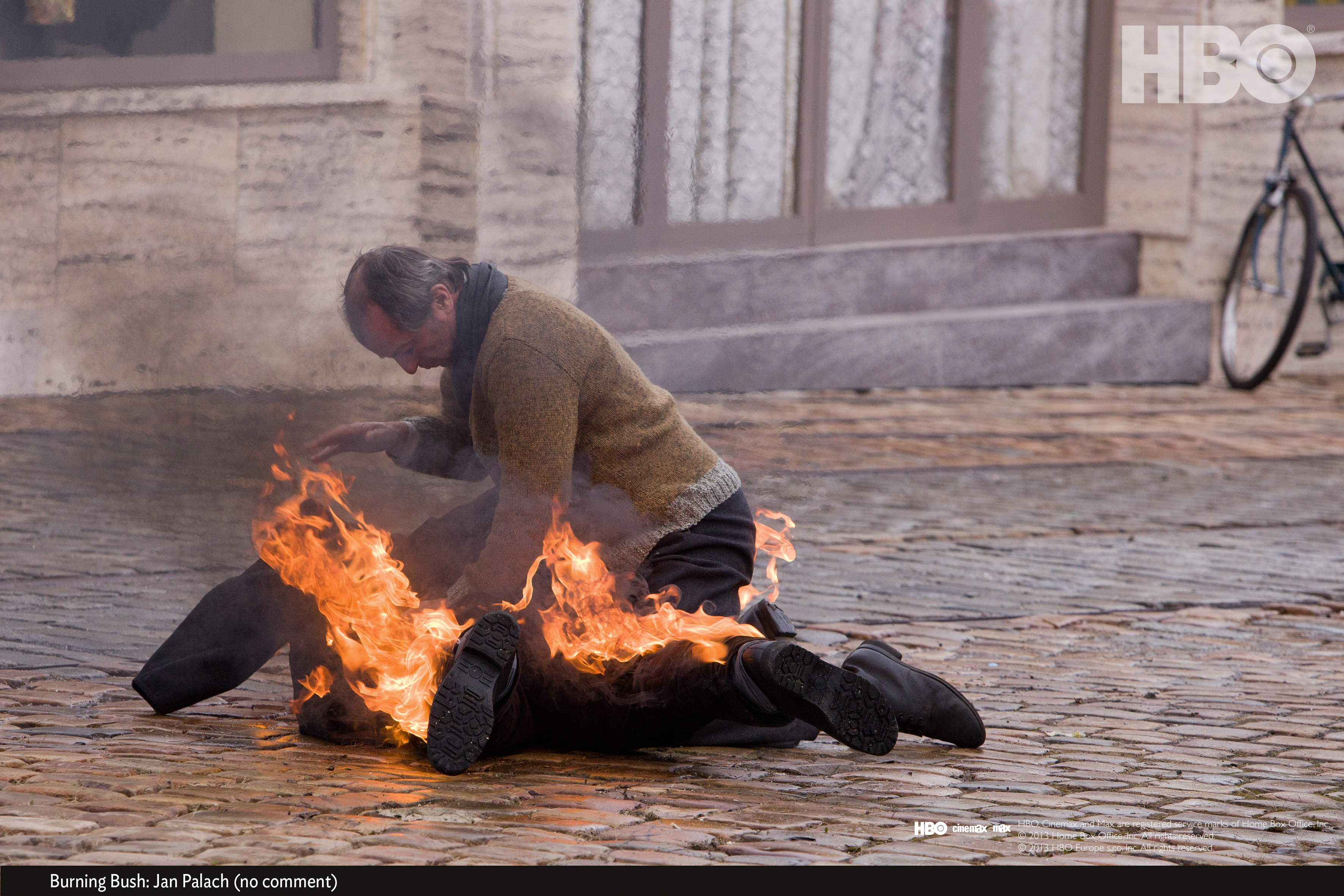
Eclecticism governs the second half of the 51st NYFF just as it did the first. According to the Times, several common threads run through the week two batch, but these are little more than on-deadline segues. We could perhaps agree that all the films run at 24 frames per second.
Below are recommendations I hope will sate the discerning ticket buyer. These are accomplished movies by directors who are not very well known in this country. Other films will sell out based on name recognition no matter the critical response, so, whether good, bad, or in-between, they will not be addressed here. Ben Stiller’s The Secret Life of Walter Mitty, James Gray’s The Immigrant, Alexander Payne’s Nebraska, Jim Jarmusch’s Only Lovers Left Alive, and Spike Jonze’s Her do have something in common: They’re all American!
This begs a couple of questions. Are there no American director discoveries? Maybe the selectors considered any supertalented domestic newcomers better fits for spring’s New Directors/New Films, which honors first and second features. Say it’s so, Joe: Why then are no directors from this country given early career retrospectives in the new “Emerging Artists” strand? It’s not that American citizenship should be a prerequisite for inclusion: It’s just that we might have a hovering imbalance given that the “Official Selection” filmmakers from the U.S. are established.
As a consequence, the gold-starred features reviewed here are all foreign. To the festival’s credit, these five works, listed in no particular order, hail from a broad range of locales: Asia, Europe, South America, and continent-straddling Palestine. Generically, they are all over the map, pun with the best of intentions.
English doesn’t have an apt way to wish someone a worthwhile screening adventure. Enjoy? Uh-uh. Have a good one? I don’t think so. Gotta go with the one used by the film-obsessed French (appropriate given that the high proportion of Gallic films in the NYFF continues unabated since year one): bon projection! .
Burning Bush, Agnieszka Holland, Czech Republic
Her work on dramatic cable series such as The Wire might have been the catalyst for the fluidity and tightness of Holland’s most recent work, such as In Darkness and the utterly astounding Burning Bush. The latter has the markings of a fine TV cop thriller, say Law and Order and its spinoffs. It is actually fact-based fiction, coming in at four hours (originally a three-part miniseries for HBO Europe) about political events darker than dark in Czechoslovakia in 1969, one year after the failed promise of Prague Spring (in which the director, then a student at the prestigious FAMU film school, took part) and the ensuing invasion by Warsaw Pact troops at the behest of Moscow.
Holland paints the iffy transactions between The Law and individual citizens with a noirish brush — police Major Jires (Ivan Trojan, who also produced) is a kindly insidious agent of oppression — then shifts more to evenly lit judicial proceedings. As in Law and Order, subplots emerge amidst an assortment of fleshed-out characters, and the narrative becomes thrillingly convoluted as additional information and suspects emerge.
Burning Bush has two main characters. University student Jan Palach publicly immolated himself in January 1969 as an act of defiance. Much of the film is about the ramifications of his courageous act on those closest to him, including family and friends, as well as those who defended his cause, namely activists in a defiant student group that ends up being shut down. Yet he is an invisible presence in this elliptical film: a human torch at the beginning (see still above), and only a photographic image on a signboard at the end, 20 years on, after Czechoslovakia dumps Communism and the USSR and the new Czech Republic honors him posthumously.
The other principal is the emotional center of the mid-section, which is virtually the whole film. Attractive Dagmar Buresova (Tatiana Pauhofova, convincing in a naturalistic performance) is the courageous, cool-headed lawyer who took on a libel case pursued by Palach’s brother and much-harassed mother against hardliner Vilem Novy (Martin Huba) for tainting the martyr’s reputation in Parliament. Given the repressive measures of the government and the dreaded secret police (STB), and the dysfunction of state institutions that continued to operate “as if” nothing had changed since the Russians took over, the verdict is a foregone conclusion.
Holland (Angry Harvest, Europa, Europa) is less interested in creating suspenseful court scenes than in detailing the steps in building the case, the instances of blackmail that insure it will not succeed, and the challenges to the regime made by a few daring souls in spite of almost certain retaliation. A coda informs us that Buresova became the new country’s first Minister of Justice in 1989. In spite of all they endured, both she and Palach were finally vindicated.
The Polish-born director perfectly captures the grayness and desperation of Prague and nearby provincial towns in the late ‘60s. Even though the film is in color, you can’t help but think of striking black-and-white Czech films from the era, many of them banned, such as the 1969 The Ear. Buildings, props, attire, hairdos — all seem to be from another age, when in fact the only element from the past is the archival footage with which the new stock is seamlessly stitched. The fantastic, giggle-provoking pre-credit sequence of young Czech teens in mismatched outfits doing the twist a bit off is a perfect introduction to the authentic re-creation ahead.
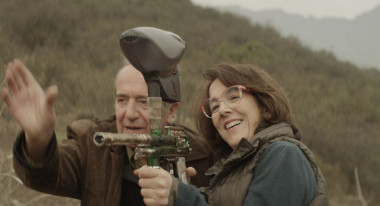
Gloria, Sebastian Lelio, Chile / Spain
At her son’s intimate birthday dinner, the title character (Paulina Garcia, who took Best Actress at Berlin) of this wonderful, well paced film, a divorcee in her late fifties, reflects on life’s “twists and turns.” The celebrants, who have all been involved in her crossroads, include her grown children, who don’t spend much time with her anymore; the estranged husband she hasn’t seen in nearly 13 years and his pretty, much younger wife; and a white-haired senior, Rodolfo (Sergio Hernandez), whom she introduces, in a huge leap of faith, as her partner, even though they only recently met at a disco club for the middle-aged and over that is her escape hatch.
The label is pushing it. Like singles half her age, Gloria’s goal is less about dancing than finding a guy to get it on with and maybe, just maybe, fall in love with. She defies the stereotypes of women at a certain age. Their first night together the pair screw exuberantly with their imperfect bodies fully exposed (he wears a girdle).
Oddly, Rodolfo dashes off quickly after each of their dates. He is still very much attached to his two grown daughters and ex-wife, all needy and dependent on him emotionally and financially. The pattern had begun at the family celebration. Disappearing without a word while the others laughed, ate cake, and imbibed loads of (presumably Chilean) wine, he humiliated Gloria.
A warm, charismatic woman full of laughter, in good physical shape, and attractive even behind oversized glasses, she makes a second mistake: She offers him a second chance. After all, most of the time he acts the gentleman, they have fun together at places like the amusement park where they spray-paint a target with a rifle, and otherwise, her days would be filled by her full-time office job, her nights by sitting alone in her apartment. She asks, however, for more than he is capable of giving. He performs the disappearing act once again, during what was meant to be a romantic 10-day holiday in the seaside resort of Vina del Mar.
After spending down time depressed at home, she exacts cathartic revenge — the method is inspiring and hilarious — and drives on to a wedding reception. She sits by herself on the sidelines, puffing away while the other guests move to the music in the center of the party. Let’s just say that when the original version of the song Gloria comes on, we get another dose of the high energy she exhibited at the disco. Lelio (The Sacred Family, The Year of the Tiger) has an ear for just the right music to suit action and mood throughout. I won’t give away the ending, but it is subtly and brilliantly executed by him and a phenomenal Garcia.
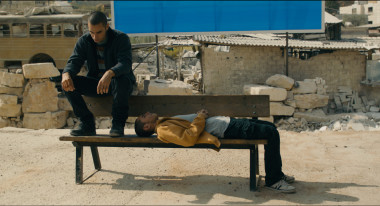
Omar, Hany Abu-Assad, Palestine
Two scenes recur in this powerful film. In the first — achieved with superb traveling shots — the eponymous protagonist (Adam Bakri), a handsome, lithe young baker living in the West Bank, darts through the stone streets, narrow alleys, and crowded outdoor market of a Palestinian town outrunning Israeli soldiers in pursuit.
In the second, he scales the infamous Separation Wall by rope to get from the side where he lives and works to the other, in order to visit Nadja (Leem Lubany), the high-school-age object of his affection, and her brother Tarek (Eyad Hourani), his closest friend and one of his two partners in a plot to shoot an Israeli soldier. The real-time sequences of Omar’s climb highlight the preposterous fact that the wall cuts through Palestinian land, separating families and friends from their own.
After the three pals successfully carry out their personal mission, unaffiliated with any organization, the Israeli military mistakenly targets Tarek, whereas the actual perp is undependable loudmouth Amjad (Samer Bisharat), who is also courting an uninterested Nadja. The soldiers figure that Omar will rat on his pal, so they corner, then imprison and torture him when he proves uncooperative.
A rumor goes around town that Omar betrayed his partners: After all, he has been released, though in truth only because he conned the Israelis into thinking he will aid them in their search for Tarek. Street smart and a quick study, he skillfully manipulates the enemy, especially “good cop” Rami (Waleed F. Zuiater, the film’s producer and its only professional actor). No matter that Abu-Assad loads the rivalry, and no matter which side you root for, you can only applaud Omar after seeing how the soldiers abuse and degrade him as much for being Palestinian as for being a criminal suspect. The unpredictable climax to this cat-and-mouse political thriller is pure genius.
Under the bizarre, morally questionable conditions of the Israeli occupation, an expected hazard is betrayal, not only between Palestinians and Israelis but also among Palestinians. The lines between good and evil become more and more blurred. While Abu-Assad (Paradise Now) dissects his characters’ unpredictable behavior, he takes us along on a gratifying tour of the town–it appears that almost everything is shot on location–documenting the tactile quality of its stone buildings and paths and the rhythms of daily life in a small urban milieu in a would-be country ripped apart by a fence.
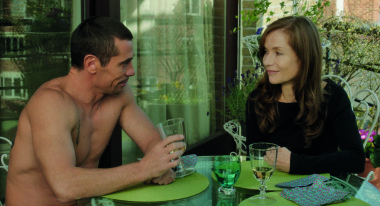
The Abuse of Weakness, Catherine Breillat, France
No wonder Maud Shainberg (Isabelle Huppert), the filmmaker subject of Breillat’s autobiographical movie, gets eerily close to con man Vilko Piran (Kool Shen), who makes some kind of living scamming and has the prison record to prove it. She has no friends, save for her a.d., and her relatives only come around at times of crisis.
It’s well known that the man on whom Breillat based Piran took financial advantage of her during the many months they engaged in a platonic relationship, which began just after she suffered a debilitating stroke that left her paralyzed on one side. “Why did you do it?” asks one of Maud’s relatives, referring to the multiple checks she wrote for him to the point of bankruptcy. “Because he was there,” she responds in a matter-of-fact tone.
Breillat makes almost understandable the effect on Maud of this crude, uneducated guy — a “caveman” she calls him to her a.d. Adapting such a seemingly implausible scenario from her own novel, she depicts her surrogate’s ups and downs, her ambivalent attitude toward dependency, and the shifts over time in her relationship with Piran. Maud and Piran’s backgrounds are completely different: She is a child of privilege, lives very well, and is intelligent and connected; he comes from poverty, is an unapologetic petty materialist, and lives high or low depending on the success of his criminal enterprises.
Huppert’s masterful portrayal of a strong, arrogant, and opinionated woman who has lost the use of her left leg and arm is a major asset in making credible the character and her otherwise implausible connection to this loser. He had entered her life after she saw him on TV and cast him as the lead in her next film (in Breillat’s life, a project that was never completed about an abusive relationship between a celebrity and the con artist who became her secret lover). Like Breillat, known for her strong commitment to her actors, Maud sets herself up to be milked by confusing friendship, carnal attraction and occupational dedication.
Had she never become ill, an “abuse of weakness” would not have transpired. Or would it? Breillat is as enormously self-critical as she is self-absorbed. Early on, when the stricken Maud anxiously phones for an ambulance, she tells an uncomprehending emergency operator, “Half of me is dead.” Later, trying to explain to her family her out-of-control check writing, she says, in all seriousness, “It was me…and it wasn’t me.”
Alain Marcoen’s cinematography is gorgeous, even if the exteriors are in otherwise non-photogenic parts of Paris — pedestrian bridges and bland surroundings in working-class neighborhoods and unattractive modern building facades around town. Short ellipses maintain interest in Maud and her troubles without trivial details. An observation: Whenever we see Maud in the company of others, they are eating or drinking. I have no idea why, and it probably doesn’t matter, but these scenes provide a much appreciated infusion of joy.
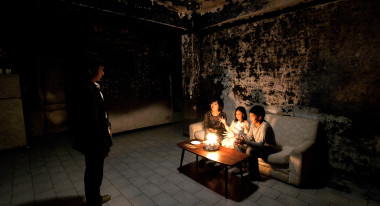
Stray Dogs, Tsai Ming-liang, Taiwan
A woman — how do you say “humanizes” in dogtalk? — the strays in a pack that roam outside a large, seemingly abandoned concrete building by giving each a name. In a similar vein, Tsai Ming-liang (I Don’t Want To Sleep Alone, Vive l’Amour) dignifies the members of a homeless family — a middle-aged father (Lee Kang-sheng, the filmmaker’s muse from the beginning of his career) and his young son and daughter (Lee Yi-cheng, Lee Yi-chieh) — who will end up living in the vast edifice.
How so? By making a visually enticing film in which he charts the daily routines of these “ordinary people.” Cunning and imagination have to sub for scant resources. We know nothing about the conditions that pushed them onto the streets. This is no study of causality: What matters to the director is the trio’s here and now.
On the surface, Tsai Ming-liang might seem to have lost his sense of humor, but it is here in spades as irony. The camera returns again and again to the father, a man barely protected from the elements at any time, earning a bit of money in the ever-present pouring rain holding a sign for the eyes of passing drivers, advertising, of all things, real estate. The director films them eating cheap takeout and scraps they come across, but returns frequently to a huge, outrageously bright, fully stocked modern supermarket where they are unable to purchase anything.
At the center of the sole scene that is laugh-out-loud funny, if also tragic, is a cabbage on which the daughter has painted a face. When her stinking drunk dad discovers it in the “bed” the three share in the makeshift claustrophobic enclosure they create on a construction site, he fondles it, gives himself an orgasm, then maniacally shreds and scarfs it.
Tsai Ming-liang creates beauty out of materials and spaces, indoor and out, that the family comes across. When they walk on the street at night, reflections of neon in the puddles of rain they trudge through are ravishing. The way light hits a fresco on the thick interior of the concrete building is seductive, even spiritual. The camera surveys one of its cracked cement walls up close to reveal amazing contrasting textures. Even the stark whiteness of the sanitized tiled public restroom where the three brush their teeth and wash daily is oddly appealing.
Very long takes and held shots of statue-like posturing make for some “relaxed” going for the spectator, but relentless aestheticism, especially for what might be for some a downer of a topic, compensates for demanding formal purity. Many of the scenes smack of poetic realism, and the filmmaker spices things up with narrative mystery. In the long opening shot, who is the lady in a shack we see only from the back, slowly brushing her hair while a boy and girl sleep in front of her? It’s not clear, but her character appears to split later into two different women: a kind, middle-aged supermarket manager, and a younger one who invites them into that sturdy building that turns out to be her home and the abode of the stray dogs, where all living things are safe.
